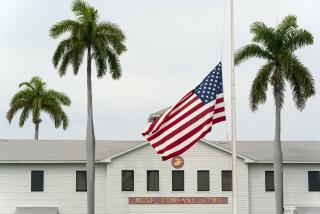Taliban commanders at Kunduz were once jailed in Pakistan
- Share via
ISLAMABAD _ Mullah Abdul Salam Akhund was the first of nine Afghan Taliban cabinet ministers arrested by Pakistan’s security services in early 2010 as part of a CIA-driven crackdown.tmpplchld Akhund, the Taliban’s shadow governor for Kunduz, was released three years later with most of the other detainees so that they could persuade Mullah Mohammed Omar, the Taliban leader, to engage in peace talks with the U.S. and Afghan governments.tmpplchld The Taliban’s former foreign minister, Mullah Mohammed Hassan, also was released.tmpplchld The two veteran militants now have something else in common: They were in charge of the Taliban forces that overran the strategic northern Afghan city of Kunduz last week. Afghan forces eventually retook the town, but the assault culminated in the apparent American bombing of the local hospital, killing at least 22 people.tmpplchld Afghanistan’s National Directorate of Security claimed last week that Akhund had been killed in a U.S.-led NATO air strike on Kunduz, but the Taliban’s spokesman, Zabihullah Mujahid, has denied the report.tmpplchld The release of Akhund and Hassan was part of a diplomatic maneuver that led to the opening last year of a Taliban representative office in Doha, capital of the Persian Gulf emirate Qatar. Taliban officials based there have since been at the forefront of diplomatic exchanges, leading to the first direct talks in August between the insurgents and the Afghan government.tmpplchld But a scheduled second round of talks in Pakistan was canceled on July 31, after the Afghan government announced that Mullah Omar, the Taliban’s founder, had died two years earlier.tmpplchld tmpplchld The fighting at Kunduz has been a public relations coup for the man named to succeed Omar, Mullah Akhtar Mansoor, and defied predictions by Afghan President Ashraf Ghani that Omar’s death would mean the demise of the insurgency.tmpplchld Kunduz was the first city to be retaken by the militants since U.S.-led multinational forces invaded Afghanistan 11 years ago.tmpplchld “The fall of Kunduz boosted Taliban morale ... and marked the extended tactical power base of the militants from south-southeast to north Afghanistan,” said Jan Achakzai, a former spokesman for the Jamiat Ulema-i-Islam, a Pakistani political party with close ties to the Taliban.tmpplchld ����tmpplchld (Hussain is a McClatchy special correspondent.)tmpplchld ___tmpplchld (c)2015 McClatchy Washington Bureautmpplchld Visit the McClatchy Washington Bureau at www.mcclatchydc.comtmpplchld Distributed by Tribune Content Agency, LLC.tmpplchld
More to Read
Sign up for Essential California
The most important California stories and recommendations in your inbox every morning.
You may occasionally receive promotional content from the Los Angeles Times.













